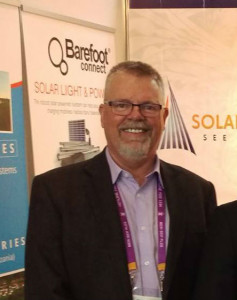Papua New Guinea has the perfect climate for solar, and is the key to achieving an ambitious government plan to bring electricity to the 70 per cent of Papua New Guineans who currently don’t have access by 2030, according to Rick Hooper, Chief Executive Officer of Sydney-based solar company, Barefoot Power.

Lighting up remote Papua New Guinea.
Barefoot Power assists people in developing countries with access to affordable renewable energy–with the focus firstly on providing lighting.
It has been operating in Kenya, the Philippines, rural India and Uganda since 2008, although Papua New Guinea was its test bed 11 years ago.
‘We used PNG in the early days because of its climate and conditions, and it proved a good test bed because our products are now very reliable.
‘Because of the government policy to give access to electricity to 85 per cent of the population by 2030… the only way the government will get that growth in electrification is by using small-scale solar.’
‘What you need is available sunlight hours. PNG being close to the equator, you get on average about 10 to 11 hours of sunlight a day and that means you’ve got effective sunlight of about eight hours.
‘Solar systems are designed around having six hours of solar sun per day so in PNG you’re able to recharge your system quite effectively because you have such long sunlight hours.’
Solar kits

Barefoot Power’s Rick Hooper
Barefoot Power exclusive PNG agent, Solar Solutions PNG, began operations over two years ago.
‘All our products are sold in kit form, and we’re seeing growing interest in the larger kits, the household kits, which give you four lights and phone charger capability, plus the ability to run a 12-volt fan, TV or radio,’ says Managing Director, Jon Pittar.
‘The market here is a little more sophisticated than some of the other starter markets in Africa, as we are selling many more of the larger kits than the single lights, which can only light one room in a house. We are also selling security lights, street lights, vaccine fridges and solar hot water systems.
‘In the villages, our customers are families who don’t have access to the grid.
‘A 30-watt kit consists of a solar panel using 12-volt battery which will run 4 lights for a family home, which usually consists of two bedrooms and a lounge room and the lights we sell them allow them to light those up quickly. They have the option of putting one light underneath the house or on the outside, because people like sitting and chatting on the veranda.
‘The uptake on radio and TV options is growing quite rapidly, but not as fast as we’re seeing in Africa. We do expect that to change as the TV stations widen their transmission range.’

Barefoot Power’s solar fridge
Most sales take place in Port Moresby and Lae, through distributors such as Hardware Haus, Titan Distributors, Anitua Hardware and Datec, says Pittar, although some of distributors have outlets throughout the country.
‘We are always looking for local businesses in the outer regions, who have the ability and resources to become a local distributor,’ he says.
‘People who are working are also buying systems and sending them back to their village and families.
‘We’ve also got various electorates in PNG looking at the quality solar option for lighting up the schools, health centres or for Rural Electrification Projects, as it is the cheapest option.
Infancy
‘Solar has only scratched the surface in PNG. Because of the government policy to give access to electricity to 85 per cent of the population by 2030 (it is currently only 13 percent), we see PNG as a key market, not only now but in the future.
‘Solar is going to be integral. The only way the government will get that growth in electrification is by using small-scale solar.
‘What you need to do is get people light first, so they educate themselves, operate small businesses, develop a mini economy and then they can afford to trade up and pay for higher power options.
‘We started off just selling lighting, but about three years we moved across to providing lifestyle electronics … So we have the fridge, the TV, a fan, radio and a charging system for phones. On the drawing board are hair dryers, clothing irons, and an air-conditioning system.’
‘It’s very feasible to achieve that goal,’ says Pittar, ‘but the only way you’ll get power into the remote areas is through small discrete, home-based systems.’
Expanding range

Solar Solution’s Jon Pittar
With its own in-house designer, Barefoot Power is expanding its range of solar-based products.
‘We started off just selling lighting, but about three years we moved across to providing lifestyle electronics,’ says Hooper, ‘because all populations across the world have the aspiration to have more and more convenience in the home.
‘So we have the fridge, the TV, a fan, radio and a charging system for phones. On the drawing board are hair dryers, clothing irons, and an air-conditioning system.
‘We’ve got two fridges,’ Pittar says. ‘One is a barefoot fridge, 55 litres, which is more for household usage but can store medicines.’
By the end of 2015, he says, the company will have a product to charge laptops.
Other ambitions include supplying power back to the grid, particularly in Port Moresby and Lae.








Speak Your Mind